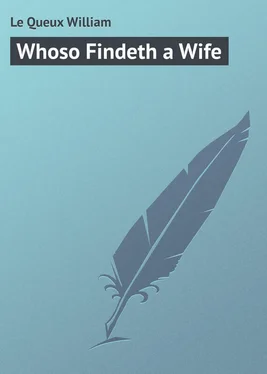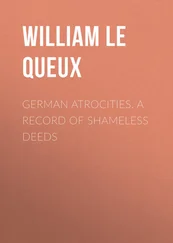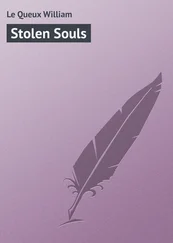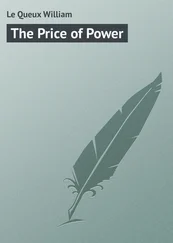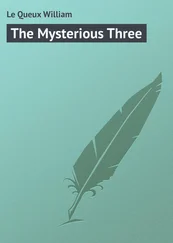William Le Queux - Whoso Findeth a Wife
Здесь есть возможность читать онлайн «William Le Queux - Whoso Findeth a Wife» — ознакомительный отрывок электронной книги совершенно бесплатно, а после прочтения отрывка купить полную версию. В некоторых случаях можно слушать аудио, скачать через торрент в формате fb2 и присутствует краткое содержание. Жанр: foreign_prose, на английском языке. Описание произведения, (предисловие) а так же отзывы посетителей доступны на портале библиотеки ЛибКат.
- Название:Whoso Findeth a Wife
- Автор:
- Жанр:
- Год:неизвестен
- ISBN:нет данных
- Рейтинг книги:4 / 5. Голосов: 1
-
Избранное:Добавить в избранное
- Отзывы:
-
Ваша оценка:
- 80
- 1
- 2
- 3
- 4
- 5
Whoso Findeth a Wife: краткое содержание, описание и аннотация
Предлагаем к чтению аннотацию, описание, краткое содержание или предисловие (зависит от того, что написал сам автор книги «Whoso Findeth a Wife»). Если вы не нашли необходимую информацию о книге — напишите в комментариях, мы постараемся отыскать её.
Whoso Findeth a Wife — читать онлайн ознакомительный отрывок
Ниже представлен текст книги, разбитый по страницам. Система сохранения места последней прочитанной страницы, позволяет с удобством читать онлайн бесплатно книгу «Whoso Findeth a Wife», без необходимости каждый раз заново искать на чём Вы остановились. Поставьте закладку, и сможете в любой момент перейти на страницу, на которой закончили чтение.
Интервал:
Закладка:
Chapter Seven
Ella’s Suspicions
The formula of the oath fell upon my ears in a dull monotone, as mechanically I raised the Bible to my lips, afterwards replying to the Coroner’s formal questions regarding my name, address and occupation. The discovery I had made filled me with fierce, bitter hatred against my dead companion, and, dazed by the startling suddenness of the revelation, I stood like a man in a dream.
Dr Diplock, the Coroner, noticed it, and his sharp injunction to answer his question brought me back to a knowledge of my surroundings. I was standing in full view of an assembly of some three hundred persons, so filled by curiosity, and eager to hear my story, that the silence was complete.
“I beg your pardon, but I did not hear the question,” I said, bracing myself with effort.
“The deceased was your friend, I believe?”
“Yes,” I answered. “He shared a furnished cottage with me at Shepperton. I have known him for some time.”
“Were you with him at the day of his death?”
“I left him at Shepperton in the morning, when I went to town, and he called upon me at the Foreign Office about one o’clock. We lunched together, and then, returning to Downing Street, parted. We met again at Shepperton later, and came here, to Staines, in response to an invitation to dinner at ‘The Nook.’ I – ”
A woman’s low, despairing cry broke the silence, and as I turned to the assembly I saw, straight before me, Ella, rigid, almost statuesque. Her terror-stricken gaze met mine; her eyes seemed riveted upon me.
“Kindly proceed with your evidence,” exclaimed the Coroner, impatiently.
“We dined at ‘The Nook,’” I went on, turning again to face him. “Then we went for a row, and on our return Mr Ogle left us to walk back to Shepperton.”
“Alone?”
“Yes.”
“Why did you not accompany him?”
“Because I had, during the evening, received a telegram summoning me away.”
“Who was the message from?”
“The Earl of Warnham,” I replied. Then obeying his request to continue, I explained how, on leaving “The Nook” about an hour later to catch my last train, I had stumbled upon the body of my friend.
Then, when I had concluded, the Coroner commenced his cross-examination. Many of his questions were purely formal in character, but presently, when he began to take me through the events which occurred at the Foreign Office, I experienced a very uncomfortable feeling, fearing lest I should divulge the suspicions that had during the last half-hour been aroused within me. It was, I recognised, absolutely necessary that I should keep my discovery a strict secret, for upon my ability to do so everything depended.
“Was there any reason why he should call for you at the Foreign Office and ask you to lunch with him? Was he in the habit of doing this?” inquired the Coroner.
“No; there seemed no reason, beyond the fact that he was compelled to come to town, and merely wanted to pass an idle hour away,” I said.
“Why did he go to London?”
“I have no idea what business took him there.”
“He never told you that he had any enemy, I suppose?” the official asked, with an air of mystery.
“Never. He was, on the contrary, most popular.”
“And no incident other than what you have related occurred at the Foreign Office? You are quite certain of this?”
For a moment I hesitated, half inclined to relate the whole story of the mysterious theft of the secret convention; but risking perjury rather than an exposure of facts that I saw must remain hidden, I answered as calmly as I could, —
“No other incident occurred.”
“Have you any reason to suspect that he was a victim of foul play?” the Coroner continued, looking at me rather suspiciously, I thought.
At that moment I glanced at Ella, and was astounded to see how intensely excited she appeared, with her white face upturned, her mouth half open, her eyes staring, eagerly drinking in every word that fell from my lips. Her whole attitude was of one who dreaded that some terrible truth might be brought to light.
“I have no reason to suspect he was murdered,” I answered in a low tone, and as I surreptitiously watched the face of the woman I loved I saw an instant transformation. Her breast heaved with a heavy sigh of relief as across her countenance there passed a look of satisfaction she was unable to disguise. She was in deadly fear of something, the nature of which I could not conjecture.
“You have no suspicion whatever that the deceased had an enemy?” asked the foreman of the jury, who had the appearance of a local butcher.
“None whatever,” I answered.
“I frequently saw Mr Ogle on the river of an afternoon with Miss Laing,” the man observed. “Was there, as far as you are aware, any affection between them?”
Glancing at Ella, I saw she had turned even paler than before, and was trembling. The question nonplussed me. In my heart I strongly suspected that some attachment existed between them; but resenting this impertinent question from a man who struck me as a local busybody, I made a negative reply.
“Then jealousy, it would appear, was not the cause of the crime,” the foreman observed to his fellow-jurymen.
The Coroner, however, quickly corrected him, pointing out that they had not yet ascertained whether death had, or had not, been due to natural causes.
Turning to me, he said, —
“I believe I am right in assuming that you are engaged to be married to Miss Laing, am I not?”
“I was engaged to her,” I replied hoarsely.
“Then you are not engaged at the present moment? Why was the match broken off?”
I hesitated for several moments, trying to devise some means to avoid answering this abrupt question. The bitter thought of Ella’s double dealing occurred to me, and with foolish disregard for consequences I resolved not to spare her.
“Because of a confession she made to me,” I said.
“A confession! What of?”
“Of unworthiness.”
“She acknowledged herself unfaithful to you, I presume?” observed one of the jurymen who had not before spoken; but to this I made no reply.
“Now, have you any suspicion that any secret affection existed between her and the deceased?” the Coroner asked, in a dry, distinct voice, that could be heard all over the room.
“I – I cannot say,” I faltered.
The movement among the audience showed the sensation my reply had caused, and it was increased by Ella suddenly rising from her place and shrieking hysterically: “That answer is a lie – a foul lie!”
“Silence!” shouted the Coroner, who, above all things, detested a scene in his Court. “If that lady interrupts again, she must be requested to leave.”
“Have you any further question to ask Mr Deedes?” he inquired, turning to the jury; but as no one replied, he intimated that the examination was at an end, and I felt that I had, at last, successfully passed through the ordeal I had dreaded.
Retiring to a seat, my place as a witness was at once taken by Beck; but scarcely had I sunk into a chair near where Ella was sitting when I felt within my hand the object I had taken from among the things found in the dead man’s possession. It had not been missed, and I wondered whether its loss would ever be detected. To keep it was, I felt, extremely dangerous; nevertheless I sat holding it in my palm, listening to the evidence of the well-known member for West Rutlandshire. His story, related in that loud, bombastic tone that had at first so prejudiced me against him, was much to the same effect as mine regarding the discovery of the body, its removal into the house, and the subsequent examination by the doctor, until there commenced the minute cross-examination.
Читать дальшеИнтервал:
Закладка:
Похожие книги на «Whoso Findeth a Wife»
Представляем Вашему вниманию похожие книги на «Whoso Findeth a Wife» списком для выбора. Мы отобрали схожую по названию и смыслу литературу в надежде предоставить читателям больше вариантов отыскать новые, интересные, ещё непрочитанные произведения.
Обсуждение, отзывы о книге «Whoso Findeth a Wife» и просто собственные мнения читателей. Оставьте ваши комментарии, напишите, что Вы думаете о произведении, его смысле или главных героях. Укажите что конкретно понравилось, а что нет, и почему Вы так считаете.
